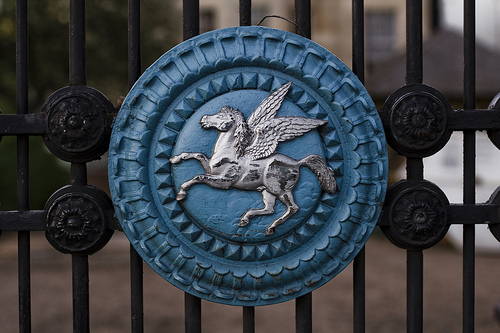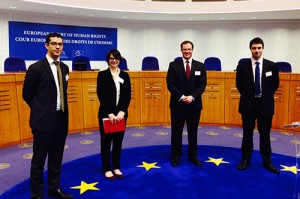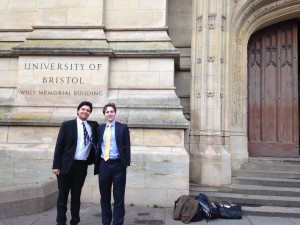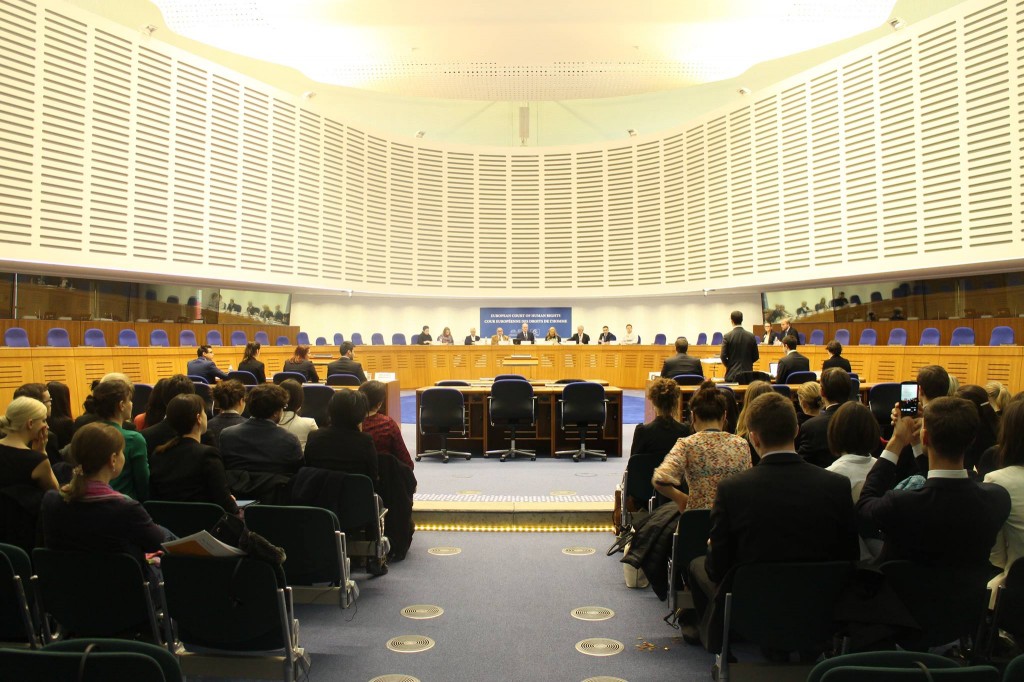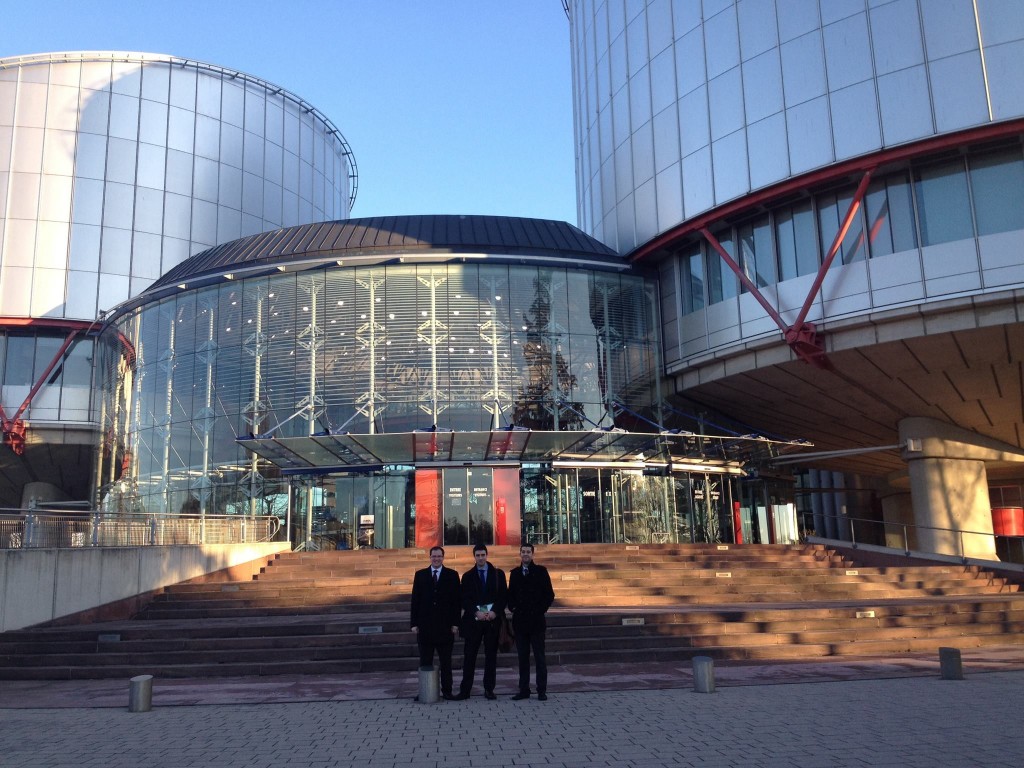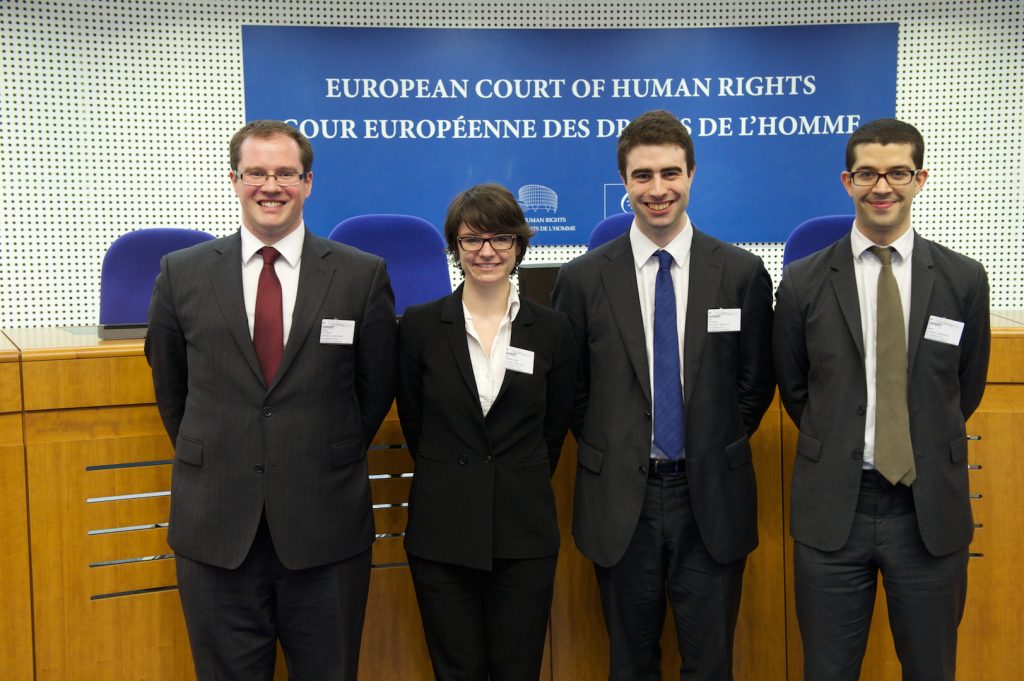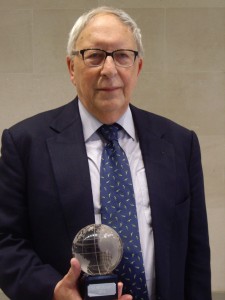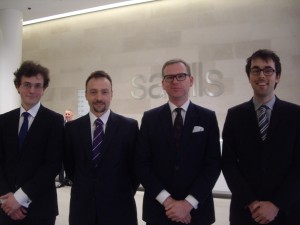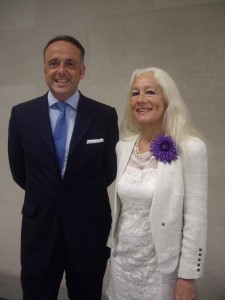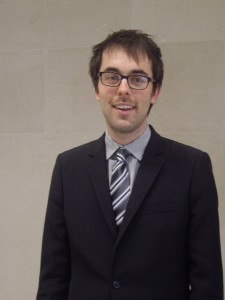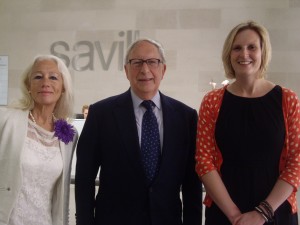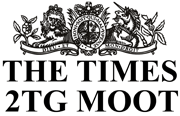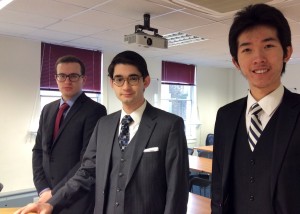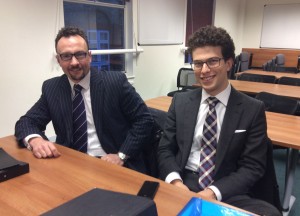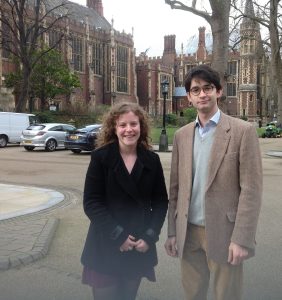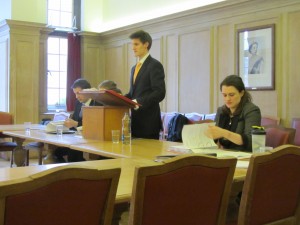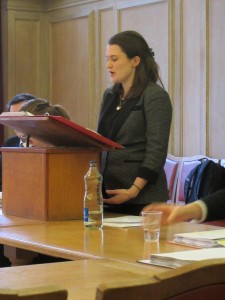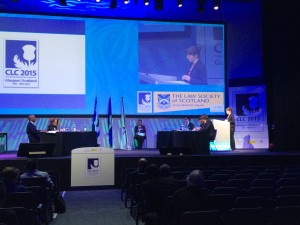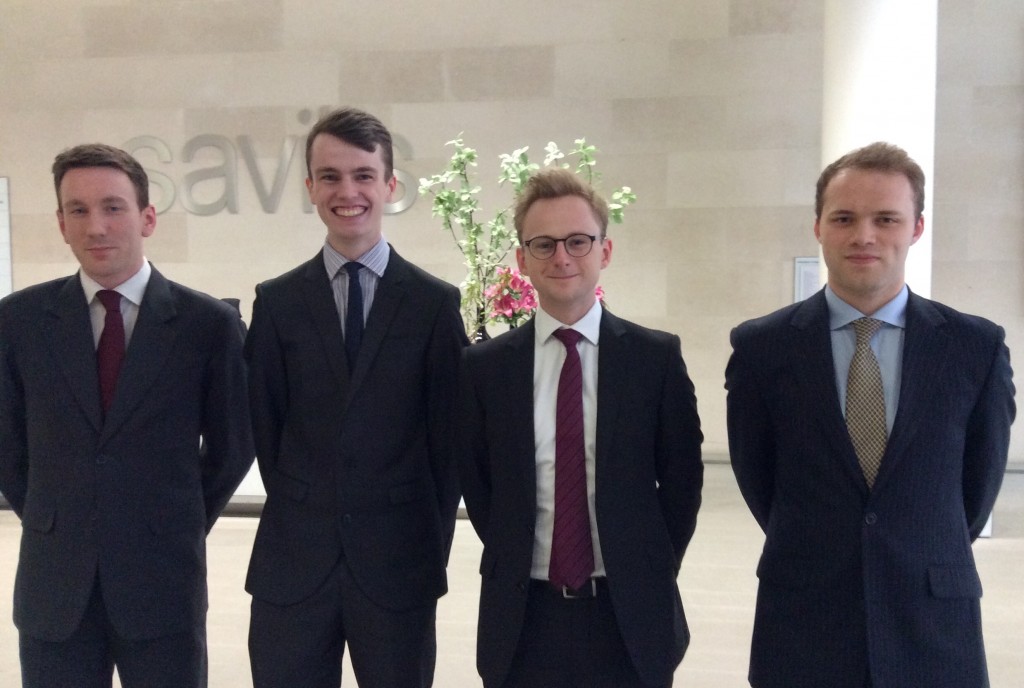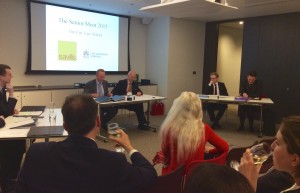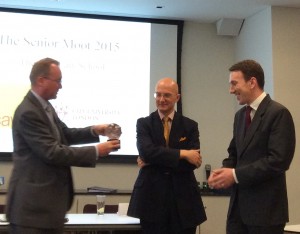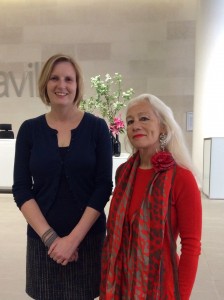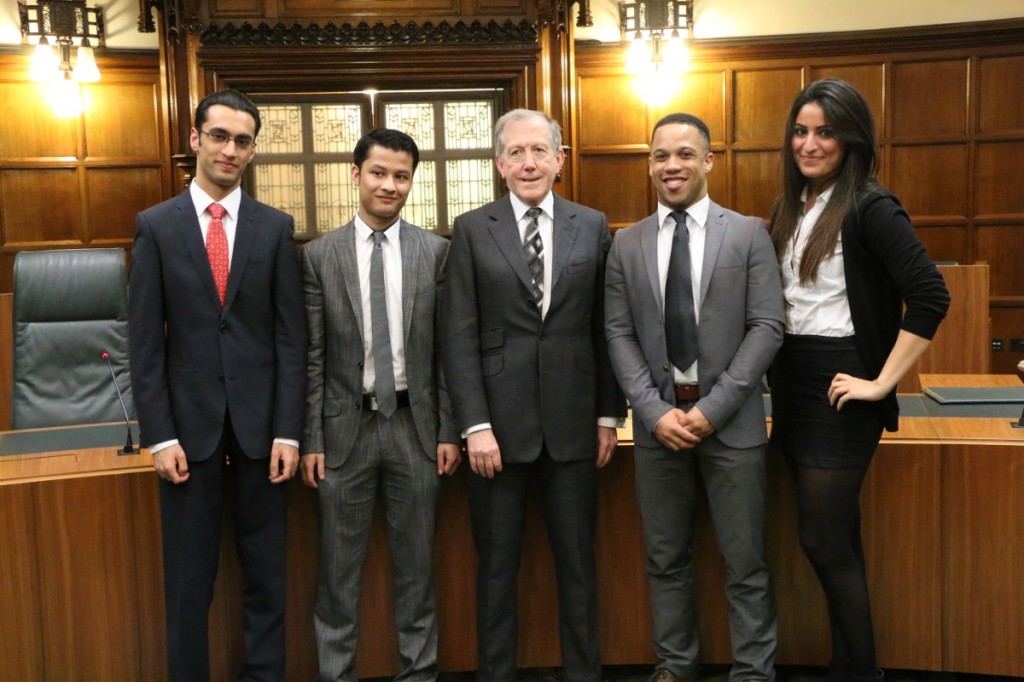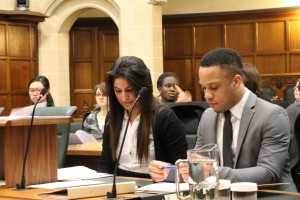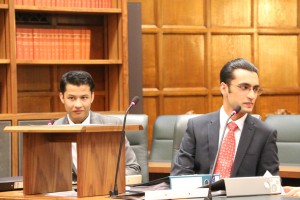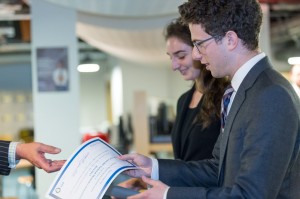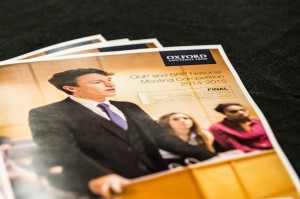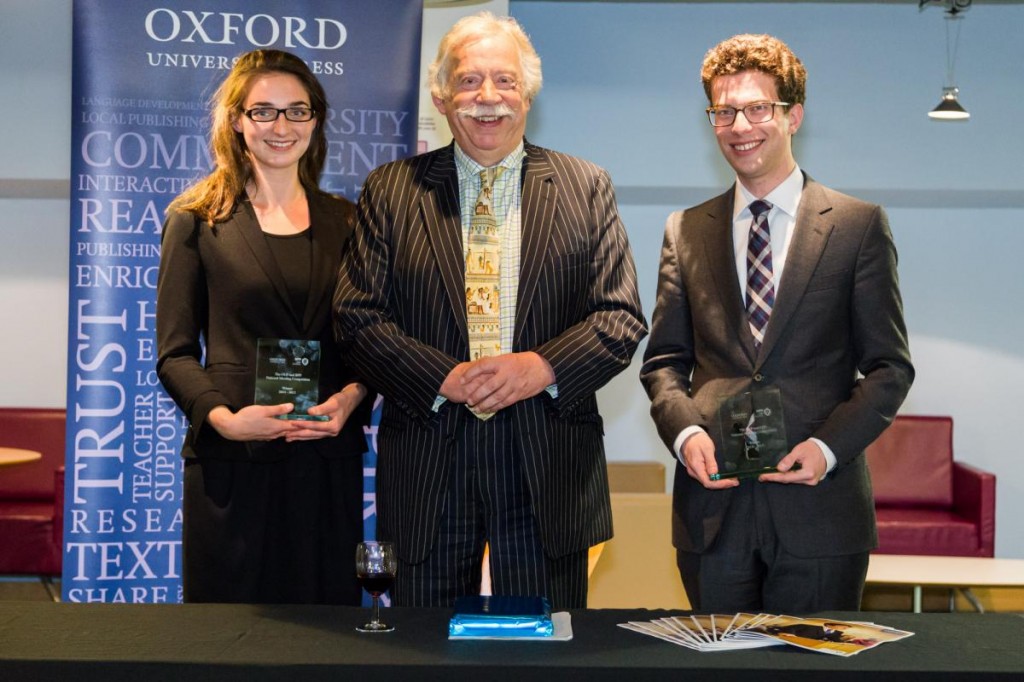The Grand Chamber of the European Court of Human Rights (ECtHR) is intimidatingly enormous and enormously intimidating. Fifty judicial seats, arranged in a parabola, surround a grand carpet with Europe’s yellow stars; perhaps ten metres away, at the focal point of the parabola, sit the advocates. On 26 February 2014, Ali Nihat, Anna Dannreuther, Howard Leithead and I faced nine judges from that focal point.
![Ali Nihat stands to plead in the Grand Chamber]()
Ali Nihat stands to plead in the Grand Chamber
The case: November 2013
It began with a case concerning sanctions taken by the imaginary state of Evrylia against a fictional journalist, Mr Adam, for online defamation and hate speech. The Court held jurisdiction primarily through Article 10 (free expression). The subject is highly topical; whilst the Court has begun to flesh out the law on internet speech in Perrin v UK, Yildirim v Turkey and Delfi AS v Estonia, substantial legal gaps remain.
For instance, if an article is hosted in California by someone living in England, does one download in France give France jurisdiction over that article? What if this leads to libel tourism, whereby litigants pursue action in the jurisdiction in which they are likely to get the best result? Who is liable for unlawful comments on the article? How far can states go in blocking those comments? And — as a current Council of Europe campaign asks — how can online hate speech be proportionately prevented?
With an English law graduate's somewhat sketchy understanding of European human rights law, we set about answering these questions.
Our first test was the written round. Forty pages of submissions were required of us: twenty for Evrylia, twenty for Mr Adam. This was no skeleton argument. Like much continental law, proceedings are primarily paper-based; consequently, written submissions involve extended argument, full paragraphs and often the citation of academia. And, reflecting their importance, the cut was brutal: of 72 teams across Europe, only 16 would survive to the European Finals in Strasbourg.
After a fortnight’s research, drafting and heated debate (should a bibliography be in one column or two?), our submissions were submitted at the stroke of midnight in mid-November. Shortly after the New Year, we learned we had escaped the cut. We would plead in the Court itself at the end of February.
Pleading orally: 23-25 February 2014
After a civilised reception in the Irish Ambassador’s residence in Strasbourg on Sunday night (at which Guinness was, naturally served), we arrived at the Court one brisk Monday morning. Textbooks tend to feature unflattering pictures of the famously faceless Court. In person, it is somewhat prettier. Its striking glassy interior, particularly, was a welcome contrast to the glamour of a Sunday practising pleading in our hostel’s ill-lit fire escape.
![Outside]()
In the preliminary rounds, we represented Mr Adam against Romania’s Alexandru Ioan Cuza University and, the next day, Evrylia against Serbia’s NIS University. Each side had half an hour to present their argument, followed by five minutes’ rebuttal; unadventurously, we divided our time equally between the defamation (Howard for Mr Adam, Ali for Evrylia) and hate speech (myself for both) points.
Reflecting the stress on written submissions, oral pleadings in European moots contrast with English ones. With 30 minutes to convey twenty pages’ worth of law, they are much more of a survey of your argument than an exposition. Where English mooters say, ‘If I could refer Your Ladyship to paragraph 14 of Axel Springer v Germany, reported in the…’, European ones prefer, ‘It is clear from the Axel Springer case-law that…’
This is made tricky in three ways. First, unlike real European proceedings, the moot judges lack your written submissions. Combining coherence and complexity of argument by mouth alone is extremely challenging, and most teams opted for fully-scripted speeches. Second, conveying this in such strictly-limited time, particularly with two speakers, requires great attention and restraint. Third, a particularly interventionist set of judges threaten to destabilise both your coherence and timing.
Despite this greater emphasis on scripting, successful improvisation remained the ultimate way to win, just as in national moots. As Applicant, our pleadings were bombarded by judicial intervention, rupturing our planned structure. As Respondent, we had to summon rebuttals on five further ECHR articles, including fair trial rights and the right to property. Having handled the first moot’s interventions well enough to re-impose some structure, and persuaded the judges of the second that the real issues were under Article 10 alone, we progressed to the semi-finals.
That night, the first social took place at a local brewery. Alarmed that Strasbourgeois’ idea of socialising including playing Yahtzee at the dinner table (with the fun bonus game of “look for the dropped dice”), we reluctantly left our new friends for our old case. Anna led our last-minute research into points raised in the preliminaries. We would represent Mr Adam, with the first shot at 9.30am the next day. Our opponents would be Kaplan Law School.
The Semi-Finals and Grand Final, 26 February 2014
Five ECtHR lawyers now faced us, in an actual courtroom, as judges. Their questions were rarer, but more penetrating; weak links in arguments were sniffed out, questioned, and hounded if incompletely answered. After excellent speeches from both sides, with particular strength in Howard and our opponent’s rebuttals, we discovered we had 90 minutes to prepare for the Grand Final.
And so we return to the beginning. The Grand Final in the Grand Chamber.
Our Athenian opponents opened for the Applicant. Their presentation was impressive, running like a curiously precise steamroller (‘we will spend twelve minutes on defamation; eighteen on hate speech’): near enough every point that could be made for Mr Adam was made, without a millisecond’s respite. Never having fully escaped the English moot style of advocacy, we sought to speak more naturally: pausing, for effect.
Opening our case, Ali pressed the specifics of their defamation argument, arguing that they had failed to engage with the facts. The Applicant had argued that only the country of original publication should have jurisdiction over a defamatory article, because that is where the harmful event — the publication — occurs. Improvising, Ali responded with a striking metaphor: ‘if I fire a gun from Germany, and the bullet injures someone in France, is the damage really caused in Germany?’ Closing it, I stole the keys from their steamroller by arguing the hate speech case was inadmissible. Alternatively, I contended Evrylia’s sanctions were lawful and proportionate. Shorter than a football match, the Grand Final ended.
Touring the Palace of Europe with the other teams, the result was too close to call: some clearly felt we needed pre-emptive comforting (‘It is very hard to be the Respondent…’); others felt our style and close engagement with the Applicant’s argument had won.
After two hours’ deliberation, the presiding judge announced that the latter were right. We had won.
![Howard, Anna, Niall and Ali - winners of the European Human Rights Moot in Strasbourg.]()
Howard, Anna, Niall and Ali - winners of the European Human Rights Moot in Strasbourg.
Postscript
Intimidating the chamber may be, but what does it all mean? The ECtHR is seen as a miracle-worker by some of Europe’s citizens; the placards we saw outside, pleading for its attention, and even rogue men shouting at the Court, ‘Give me back my video camera! This is not human rights!’ attested to this. It is no miracle-worker; but, as we saw through attacking and defending a government’s actions in Strasbourg, it is an important check on state power. At a time of considerable constitutional and political tension between the UK and the Court, it is heartening that five English teams reached the European finals. Just as heartening is the way that this moot transcends our parochial national boundaries and brings together future lawyers from across Europe.
We would like to thank Clare Brown for her fantastic coaching and City Law School for its substantial contribution towards our expenses.
Thanks to Niall for giving us a glimpse into their few days in Strasbourg at the European Human Rights Moot Court Competition, organised by ELSA in co-operation with the Council of Europe. Read the CityNews piece about Niall, Howard, Ali and Anna's success.
